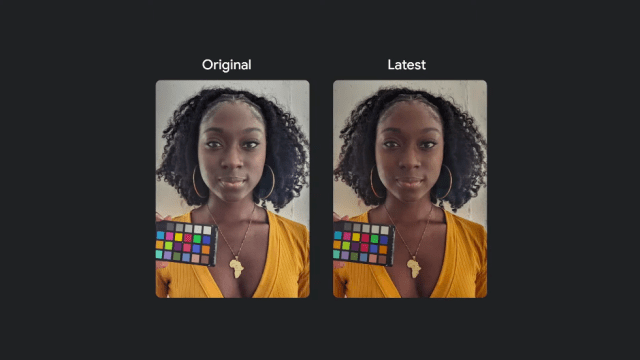Android is used on 3 billion smartphones worldwide, but most of the cameras on Android phones don’t accurately capture people of colour. This is why Google announced it’s striving to develop a “more accurate and inclusive camera” for its next batch of smartphones.
Toward the end of the Google I/O 2021 opening keynote, Sameer Samat, vice president of Android and Google Play, explained that the company is consulting with a diverse team of photographers, artists, and designers to help improve its computational photography algorithm. The goal is to make the Pixel better at adjusting white balance, exposure, and colour temperature based on varying skin tones. The computer will also consider hairstyles, including a more accommodating portrait mode for curly and wavy hair.
“As part of our ongoing commitment to product inclusion, we’re working to make technology more accessible and equitable,” Samat said during the presentation. “For people of colour, photography has not always seen us the way we want to be seen, even in some of our own Google products.”
It’s no secret that there is a racial bias inherent to photography. Light skin became the benchmark for calibrating colour in photography and films. Even digital negatives are predisposed to favour lighter skin tones over darker ones. It can be even worse in smartphone cameras, since they rely on post-processing to make their images look shareable. But smartphone software can be programmed to look for variations in skin tone.
Google’s effort to make its Pixel smartphones more equitable in the way they capture folks will certainly make people feel seen by the platform. But the sentiment also rings hollow when you consider the headlines that preceded this year’s developer conference. Google’s internal workplace struggles have been routinely documented over the last few years, especially in recent months surrounding the abrupt firing of former staff research scientist and co-lead of ethical AI at Google, Dr. Timnit Gebru. Recent reports also indicate that Black and queer AI groups have signed a petition in solidarity with Gebru to refuse funding from Google, citing the company’s repeated inconsistencies in supporting underrepresented researchers.
Google didn’t specify if the next flagship Pixel smartphone would be the model with the new computational photographic algorithm built in. But Google’s efforts to make AI more diverse certainly deserve scrutiny until there’s more transparency over what’s happening in its AI research division.
